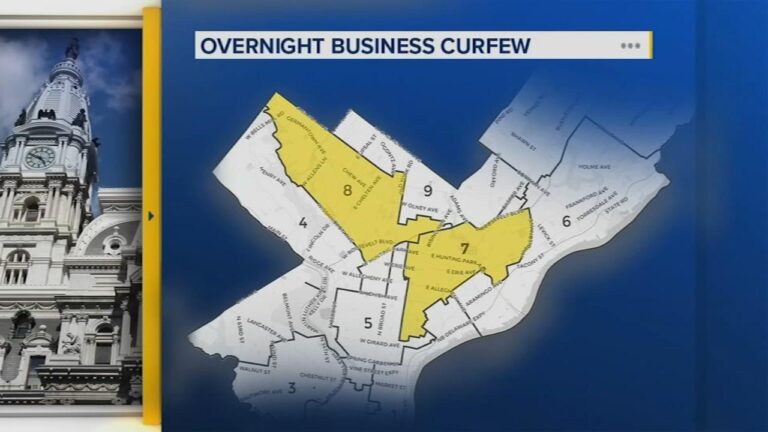Philadelphia’s New Nighttime Curfew: Implications for Businesses and Public Safety
Citywide Curfew Enforces Early Closures Across Philadelphia’s Night Economy
Philadelphia has recently introduced a comprehensive curfew requiring most non-essential businesses to shut down during late-night hours, a move designed to address escalating unrest and bolster public safety. This ordinance compels restaurants, bars, retail outlets, and entertainment venues to close earlier than usual, disrupting the city’s vibrant nightlife and altering daily operations for many establishments. Business owners have voiced concerns about the sudden nature of these restrictions, emphasizing the challenges posed to revenue generation and employee scheduling. Industry leaders are urging municipal authorities to provide clearer guidance and financial support to ease the transition during this period.
City officials stress that the curfew is a strategic response to reduce incidents that typically spike after dark. Law enforcement is prioritizing cooperation and compliance over punitive measures, encouraging community members to adhere to the new regulations. The curfew’s impact spans several key sectors, including:
- Hospitality and Food Services: Mandatory closure of dine-in and bar services by 10 PM.
- Retail Businesses: Suspension of operations for non-essential stores during curfew hours.
- Public Transit: Adjusted schedules with nighttime service reductions aligning with curfew enforcement.
| Sector | Typical Operating Hours | Hours Under Curfew |
|---|---|---|
| Restaurants & Bars | Open until 2 AM | Close by 10 PM |
| Retail Stores | Open until Midnight | Close by 10 PM |
| Public Transportation | 24/7 Service | Suspended from 10 PM to 5 AM |
Financial Consequences for Small Businesses and the Broader Economy
The curfew’s enforcement has delivered a substantial setback to Philadelphia’s small business community, which heavily depends on evening and late-night patronage. Many establishments report sharp declines in sales, raising alarms about their ability to meet fixed costs such as rent and wages. The uncertainty surrounding the duration of these restrictions exacerbates concerns about long-term viability. Business owners are calling for economic relief and clearer timelines to better plan their operations.
Economic analysts warn that the curfew’s effects ripple beyond individual businesses, potentially weakening the city’s overall economic health. Key repercussions include:
- Rising unemployment: Reduced hours may force layoffs or reduced shifts.
- Lower pedestrian activity: Decreased foot traffic impacts ancillary services like delivery and transit.
- Declining municipal revenues: Reduced sales tax collections could strain public budgets and delay community initiatives.
| Industry | Projected Revenue Decline (%) | Main Challenges |
|---|---|---|
| Food & Beverage | 45-65% | Shortened hours, limited customer capacity |
| Retail | 30-45% | Fewer evening shoppers |
| Entertainment & Events | 55-75% | Event cancellations, venue shutdowns |
Public Safety Rationale and Community Reactions to the Curfew
The 10 PM curfew has sparked a range of responses from Philadelphia’s residents and business community. City leaders present the curfew as a critical tool to reduce nighttime violence and property crimes, which have surged in recent months. Many residents cautiously welcome the measure, hoping it will foster safer streets during late hours. Conversely, some business owners and patrons express apprehension about the economic toll, particularly in neighborhoods where nightlife is a key economic driver.
Law enforcement agencies cite recent crime statistics to justify the curfew, aiming to achieve the following objectives:
- Decrease after-dark violence: Targeting reductions in assaults and shootings occurring post-10 PM.
- Prevent looting and vandalism: Restricting access to commercial zones during vulnerable periods.
- Optimize police resource deployment: Concentrating patrols during peak crime hours for greater effectiveness.
| Safety Indicator | Pre-Curfew Weekly Average | Expected Post-Curfew Weekly Average |
|---|---|---|
| Nighttime Assaults | Approximately 45 incidents | Projected 25 incidents |
| Property Crime Reports | About 60 incidents | Estimated 35 incidents |
| Police Night Patrols | 30 patrols per night | Increased to 50 patrols per night |
Adaptive Measures for Businesses Amid Curfew Constraints
To navigate the challenges posed by the curfew, businesses are innovating their operational models and customer engagement strategies. Many have extended daytime service hours, offering early-bird specials and lunch promotions to capture more daytime traffic. Digital channels have become vital, with increased investment in online ordering platforms, contactless delivery, and curbside pickup options to sustain sales despite limited in-person access. Transparent communication about revised hours and service options via social media, email campaigns, and storefront notices is crucial to maintaining customer relationships during this transition.
Moreover, collaboration within the business community has intensified, with local chambers of commerce and trade associations facilitating resource sharing, compliance guidance, and access to financial aid programs. The table below summarizes effective strategies businesses are employing:
| Approach | Advantages | Implementation Examples |
|---|---|---|
| Flexible Workforce Scheduling | Maximizes staff efficiency | Shortened shifts, staggered start times |
| Strengthened Digital Presence | Engages customers beyond physical hours | Social media marketing, e-commerce platforms |
| Contactless Service Options | Enhances safety and customer trust | Curbside pickup, home delivery |
| Community and Industry Partnerships | Access to shared resources and support | Joint promotions, cooperative purchasing |
Looking Ahead: Balancing Safety and Economic Recovery
As Philadelphia enforces this new curfew, the city’s nightlife and business sectors face considerable upheaval. While the primary goal remains enhancing public safety, the economic consequences for local businesses are profound and ongoing. City officials, entrepreneurs, and residents will be closely monitoring the curfew’s effectiveness in reducing crime and maintaining order, alongside its broader impact on economic vitality and community well-being. Continued updates and analyses will be essential as this situation evolves.


